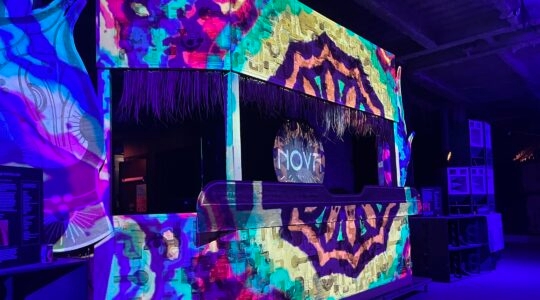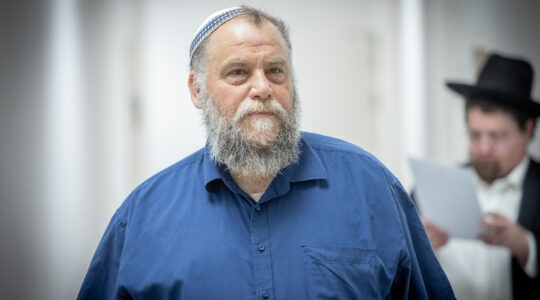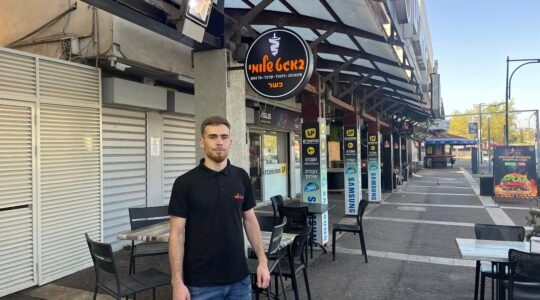KARNEI SHOMRON, West Bank (JTA) — Just weeks after we immigrated to Israel in August 2000, I was summoned to the principal’s office of my daughter’s elementary school. Two weeks earlier she had entered first grade, another big step on top of the many big steps it took to get us to Israel.
The principal neither spoke nor understood much English, and I neither spoke nor understood much Hebrew. But during our brief meeting, she managed to communicate to me that my daughter would not have as many hours of assistance during the school day as we thought. Also, the teacher was having difficulty teaching a child “fresh off the boat” who could not understand a word of Hebrew — though she could read the language perfectly, having learned it in kindergarten at a Cleveland-area day school.
I left the school and began the mile-long trek back to our apartment (we would not buy our first car, which we are still driving, for another six months), when a car pulled up and offered me a ride. The driver was an English-speaking woman with a daughter in my first-grader’s class who had made aliyah many years before us.
When she asked how everything was going, I burst into tears and spent the next half hour crying in the front seat of her car as she consoled me and promised that our life in Israel would only get better.
Ten years later, my youngest daughter has just entered first grade. She arrived in the classroom with her pink orthopedic backpack filled with the proper school supplies. Israeli born, she speaks perfect Hebrew and English.
My five children all started school this month with confidence and the proper supplies. This time, we all know what we’re doing.
My oldest daughter, now in the 11th grade, speaks, dresses and acts like a native Israeli. Though she remembers the trauma of that first year, she is acing her studies and has a packed social life. And the woman whose front seat I dampened with my tears is now one of my closest friends in Israel.
As my family and I mark our 10th anniversary in Israel, I am overcome with mixed emotions.
It wasn’t easy to pack up and leave our family and friends to come here, though we were greeted by both family and friends when we arrived. It was not easy to adjust to a new culture, a new language, a new way of life.
But we knew Israel would be the best place to raise our Jewish children, where they would learn about their Jewish past, participate in their Jewish present and prepare for their Jewish future, and where we would have a front-row seat to Jewish history.
During our “Living in Israel” workshops in Cleveland before we made aliyah, a Clevelander who dedicated her life to helping Jews make aliyah, though she never did, told us again and again that it would not be easy here. But if you can make it, Shirley Goodman always added, it will be worth it. It was a mantra that she drilled inside my head, and one that I whisper to myself even now, when the going gets tough.
Much has changed in 10 years. A decade ago my mother and I began by e-mailing each other every day; today we speak daily on an Internet phone. I have a Cleveland phone number, allowing relatives and friends to call me without worrying about the cost. But besides the daily calls to and from my mom — my father died 2 1/2 years ago — that phone does not ring much.
I have accepted that I am not part of the daily fabric of our American family and friends’ lives. We still remain close, but it is a different kind of close — one that is very far away.
Learning Hebrew has been a struggle for me. With my dearth of Hebrew language skills, my Midwestern accent and my lack of Middle Eastern aggressiveness, Israelis on the street often ask me how long I have been here. When I answer, sheepishly, that it has been 10 years, they wave their forefinger in front of my face and cluck their tongues, reprimanding me for my poor Hebrew. My kids speak perfect Hebrew, I assure them.
While I can get through a shopping trip, and even an elementary school open house, having a protracted conversation with an Israeli neighbor still eludes me. Hence, most of my close friends in Israel remain Anglos.
We moved to the West Bank community of Karnei Shomron because my husband’s three sisters and their families already lived here. No absorption center could have made us feel as welcome as they did, and continue to. It didn’t take us long to realize it wasn’t just any new home community.
Shortly after the first anniversary of our aliyah, on our way home from the Israeli city of Kfar Saba for a celebratory dinner, we were caught in a one-hour traffic jam on the two-lane highway that leads to our community. Ten minutes ahead of us, a family from our neighborhood driving a minivan similar to ours had been attacked by Palestinian snipers, leaving the pregnant mother of five dead and her husband and oldest daughter in wheelchairs.
The second Palestinian intifada had began less than two months after our aliyah, and the fact that I could not understand the Hebrew news and had limited Internet access served me well. If I had known during that first year of our aliyah how bad things really were, I probably would have turned around and fled back to Cleveland. Instead, our neighbors called us brave.
Since then we have witnessed evacuation from the Gaza Strip, wars in Lebanon and Gaza, and a host of peace initiatives. Recently, with the relaunch of direct peace talks between Israel and the Palestinians, attacks on our road, which have waxed and waned over the years depending on the political situation, again have increased.
Every time I return to Cleveland for a visit, some well-meaning friend asks me when we are going to finish up in Israel and “come home.” I usually just smile and change topics.
It is hard to put into words that as much as I love the United States, we come home to Israel. It’s not just that this is the Jewish homeland; it’s where we have moved our lives.
It amazes me that immigrants from the United States are still coming — 3,350 from September 2009 until this September alone. They come, even as we face our most serious water shortages ever, as our political leaders are investigated on corruption charges left and right, as Hamas gains power on our southern border and Hezbollah on our northern border, as we hold our collective breaths and wonder which direction the current peace talks with the Palestinians will take.
In the days leading up to our aliyah’s 10th anniversary, we hosted for Shabbat dinner a family that had just made aliyah to our community. In their voices I could hear the stress and panic, as well as the excitement and hope. I cannot imagine doing it all over again.
This week I took my oldest child, my 16-year-old daughter whose first-grade year was so tough on both of us, to get her te’udat zehut, or national identity card. Next to her smiling picture, her card identified my husband and me as her Israeli parents. The card represents a victory of sorts. We did it.





